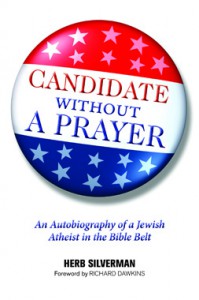Candidate Without a Prayer: An Autobiography of a Jewish Atheist in the Bible Belt

“If a man is going to publish his life story, he had best take the precaution of leading an interesting life first. Or at least to being a very funny writer or of lacing his pages with wittily unconventional wisdom. Or even being just an exceptionally nice person. Fortunately, Herb Silverman ticks all these boxes, and more.”
With these words, Richard Dawkins (yes, the Richard Dawkins) begins the foreword to Herb Silverman’s Candidate Without a Prayer: An Autobiography of a Jewish Atheist in the Bible Belt, and Silverman deserves every word.
I first met Herb Silverman in the 1990s when we served on the board of the American Humanist Association, where his humor, clear thinking, and thoughtful nature helped move our meetings along. However, his attire and appearance, which trended toward the hippie end of sartorial splendor, explain why I was shocked to find a photo included in the book of Silverman dressed in an oversized tuxedo for a presentation he gave at Oxford. For a moment I thought Abraham Lincoln had risen from the grave.
Before reading Candidate Without a Prayer, I already knew of Silverman’s efforts on behalf of humanist and atheist causes, and that he’d taught mathematics at the College of Charleston in South Carolina, but his opening chapters were a revelation. Why? Because we grew up in very different worlds—I in an average Northern Minnesota family where religion or ethnicity was never an issue, and Herb in a Philadelphia family where Jewishness was everything. For young Herb this included a loving, “control freak” mother whose attentiveness to her son included ironing his shoelaces. (Yes, you read that right.) Thus, when Herb arrived at college, his roommate had to teach him how to boil water and change a light bulb.
I had expected Silverman’s pre-college chapters to be a bit of a slog (mine certainly would have been), but instead they provided a keen and unique look into Jewish culture. Though the entire book is first rate, those opening chapters were, for me, among the best. In addition to such valuable insights, it also turns out to be the most expensive book I’ve ever read. (More on that later.)
I was surprised to learn that Silverman had joined a fraternity in college, then pleased that he’d been elected its president. I was not surprised that he had been arrested for protesting the Vietnam War, that he had been an early advocate for women’s rights, or that, upon learning in 1990 that the South Carolina constitution prohibited atheists from holding public office, he decided to run for governor. Incidentally, that was when he met his future wife, whom he calls his first and only groupie. Silverman wasn’t elected governor but, as he puts it, “with politics in my blood … I decided to try to fulfill my lifelong dream of becoming a notary public.” This time he won. Bigotry lost.
In the ensuing years, Silverman founded the Secular Humanists of the Low Country, followed by the Coalition for the Community of Reason, which later evolved into the Secular Coalition for America (SCA). His tireless work for reason and against bigotry makes inspiring reading in chapters titled, “Discussions on Religion,” “Debates on Religion,” and “Essays on Religion.” Silverman then turns to his first occupational love in the chapter titled “Mathematics and God.”
Candidate Without a Prayer (Humanist Press’ first ebook) is a candid, well-written, and captivating read, but be advised: it might cost you. I was so moved by Silverman’s remarkable story, I donated $200 to the SCA. Don’t say I didn’t warn you.
